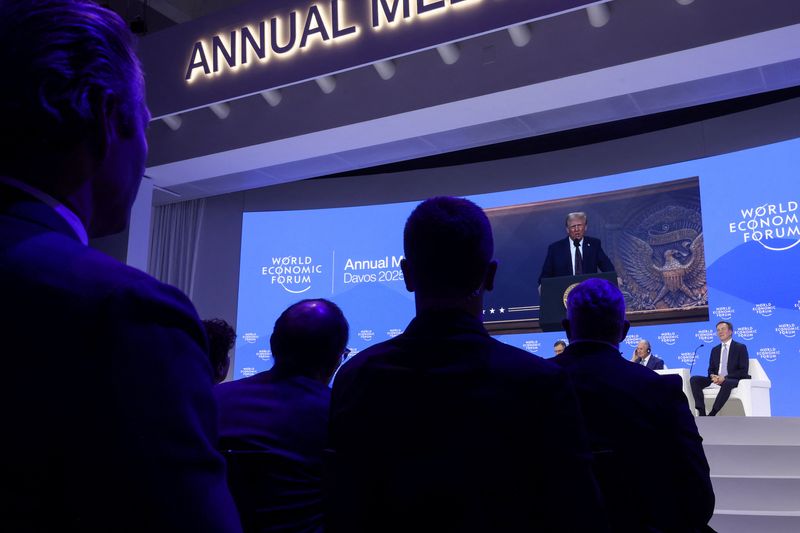By Divya Chowdhury and Lisa Pauline Mattackal
(Reuters) - Business leaders in Davos joined calls by U.S. President Donald Trump for the European Union to speed up efforts to reduce regulation and increase competition to prevent the bloc from falling further behind other developed markets.
Trump told the world's business elite at the World Economic Forum's annual meeting in Davos, Switzerland, via video conference on Thursday that the European Union treated the U.S. badly and made it difficult to get products into Europe.
He warned that companies should make products in the U.S. or face tariffs, and said that under his administration the U.S. would be the best place to build factories and create jobs.
Speaking at Davos, executives noted that Trump's promises to roll back corporate regulation in the U.S. had added fresh urgency to the EU's long-running discussions on how to increase competitiveness.
"They're rolling back regulations in the U.S. fast, so it makes it more important to do (so) in Europe," said Nicolai Tangen, CEO of Norges Bank Investment Management, one of the world's largest investors.
Decreasing corporate regulation was a key campaign pledge for Trump, who has already rolled back rules on oil and gas drilling within his first days in office.
Other executives said that, while EU's political rhetoric on deregulation has been encouraging, they wanted to see quick action.
"I think there is a willingness and ability to move forward with speed (but) we'd like to see that in action - we haven't seen that so much yet," Erik Ekudden, chief technology officer at Ericsson (BS:ERICAs) told the Reuters Global Markets Forum.
"We need to move fast ... Europe (does not) lack ideas, it's an issue of implementation," said German Merck (NSE:PROR) Group's CEO Belen Garijo, adding, however, that the catalyst for increasing competition should not be forced by U.S. policy.
SLOW PROGRESS
Leaders including former European Central Bank chief Mario Draghi and EU Commission head Ursula von der Leyen have highlighted the need for the bloc to increase innovation and reduce red tape to stay competitive.
However, concrete progress remains slow, with EU member states unable to agree on issues from the energy sector to capital markets reform.
The rapid growth of artificial intelligence (AI) technology has further increased the need for growth to not be hindered by regulation, said Thomas Saueressig, executive board member at German software developer SAP.
"The key question is how will AI regulation (be) on the global scale? The context for Europe is clear, to stay competitive there needs to be a change," Saueressig said.
Europe's lag in technologies such as AI could represent a loss of trillions off gross domestic product if not addressed, said Merck's Garijo.
"People are tired of listening to the same old story ... what happens in the next 100 days, in the next two years?" said Joe Kaeser, chairman of Siemens (ETR:SIEGn) Energy.

"If those questions are not being answered ... nobody outside Europe will invest (in Europe)," Kaeser said.
(Join GMF, a chat room hosted on LSEG Messenger, for live interviews: )